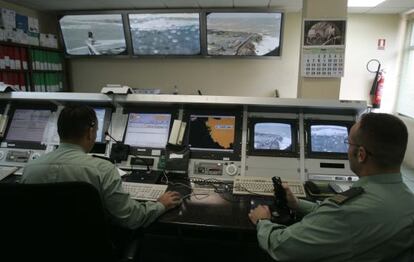Civil guards and a customs official on trial for aiding drug traffickers
Agents allegedly helped criminal gang disable surveillance and tracked police cars

They allegedly provided the necessary cover for a drug organization to safely introduce hashish shipments into Spain via the coast of Huelva, in Andalusia. It was a well-oiled machine that worked out of the town of Cartaya thanks to two Civil Guard officers and one customs official, who contributed the necessary information to safely bring in three drug consignments of over 3,600 kilograms in total between October 2010 and February 2011.
Until February 23, 2011, when most of its members were arrested, the drug syndicate was made up of 13 people who are currently being tried by the provincial court of Huelva. The investigation was led by a court in the nearby municipality of Ayamonte, and carried out by the Civil Guard and the Anti-Drug Attorney's Office. The public prosecutor is charging the ring with crimes ranging from money laundering to possession of firearms, and seeking prison sentences of up to 98 years.
The head of the ring was Leopoldo G.M., a 35-year-old mechanic who went by the nickname of "The Duke of Cartaya," and whose lifestyle was clearly incompatible with his income, the investigation found. He had two aides, Fermín G.H. and Israel G.A., who had had no legal employment for the last few years.
The ring's tentacles extended into the Civil Guard. The Duke of Cartaya knew that he could count on J.M.T., an officer stationed at the Maritime Service, whose job it was to warn the drug traffickers about scheduled patrols and let them know the best days to avoid getting caught.
The syndicate sabotaged the SIVE security system by shooting at the radar
Then there was J.L.A., another Civil Guard officer who worked in the law enforcement agency's automotive section and secretly placed electronic tracking devices inside the patrol cars that went in for repairs in the provincial capital and in Gibraleón. Thanks to this system, The Duke had privileged information about the location of patrol cars on the days when shipments were due in.
The organization also enlisted the help of a security watchman at the port area of Muelle del Tinto. He was in charge of informing the drug ring of the movements of other vessels on shipment days. The drug syndicate once even sabotaged the Integral Outside Surveillance System (SIVE), set up to locate boats carrying illegal immigrants in the Strait of Gibraltar, by shooting at the radar and the surveillance camera and cutting the cables, in order to ensure the safety of a consignment.
During the trial, the chief inspector of Huelva's narcotics division mentioned an exchange of messages between the ring leader Leopoldo G.M. and the Civil Guard officer J.L.A., regarding the SIVE incident. According to records of the telephone calls, the officer told Leopoldo: "I'm with you. I am your shadow."
Five of the defendants are Romanian nationals who unloaded the drugs at Muelle del Tinto. J.M.T., the Civil Guard officer who worked for the Maritime Service, said in court that he personally knew Leopoldo G.M., but denied any ties to his criminal organization. The police found 6,000 euros in cash inside his home, but he claims that his father gave him the money. The search also yielded two GPS devices and night vision goggles. The defendant claimed that he used them "to go into a room with poor visibility."
Other individuals who gave evidence in the trial include María T.M., the ring leader's girlfriend, who is charged with money laundering, and Teddy A.V.N., a Frenchman who is thought to have helped with one of the drug consignments. The trial continues.







































